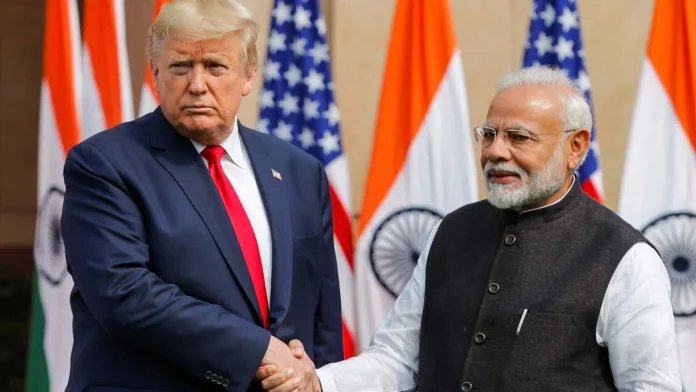Former U.S. President Donald Trump has stirred the global diplomatic conversation with his recent statement, claiming that the United States played a pivotal role in preventing a potential nuclear conflict between India and Pakistan. The assertion has sparked widespread reactions, raising questions about the role of the U.S. in South Asian geopolitics and its impact on the longstanding tension between the two nuclear-armed neighbors.
In This Article:
A High-Stakes Diplomatic Moment: The Background
The South Asian region has long been a flashpoint for geopolitical tensions, especially between India and Pakistan. Both countries have fought multiple wars since their independence in 1947, and their nuclear capabilities have added a dangerous dimension to their rivalry. Despite several efforts to mediate peace, the threat of a nuclear confrontation has always loomed large, especially during moments of heightened military standoffs.
Trump’s Bold Claim on U.S. Mediation
In a recent interview, Donald Trump claimed that during a critical period of military tension between India and Pakistan, his administration intervened to prevent the situation from spiraling into a full-fledged nuclear war. He suggested that the U.S. threatened to halt trade with both nations unless they agreed to a ceasefire.
The former president’s comments came as a part of a broader discussion on his foreign policy successes, but the assertion has raised several eyebrows. While Trump did not provide specific details on when or how this intervention took place, the claim has left many questioning the actual role the U.S. played in such a critical moment in history.
The India-Pakistan Conflict: A Long History of Tensions
The relationship between India and Pakistan has been fraught with hostility and war, dating back to the partition of British India in 1947. The two nations have fought three major wars and engaged in numerous military skirmishes over issues like the Kashmir dispute, terrorism, and territorial sovereignty. The nuclearization of both countries in the late 1990s added a new dimension to the conflict, making the possibility of a full-scale war not only devastating but also potentially catastrophic for the entire region.
The 1999 Kargil War, the 2001 Indian Parliament attack, and the 2008 Mumbai attacks have all been significant flashpoints in the ongoing conflict between India and Pakistan. These incidents, coupled with the ever-present nuclear threat, have kept the world on edge regarding the possibility of a nuclear confrontation between the two countries.
In recent years, the situation has remained tense, with periodic flare-ups along the Line of Control (LoC) and in the disputed Kashmir region. The threat of escalation, particularly following events such as the 2019 Pulwama attack and the subsequent Balakot airstrikes, has been a constant concern for global security.
Global Reactions to Trump’s Statement
Trump’s claims have sparked mixed reactions from international observers, diplomats, and analysts. Some argue that the U.S. has long had a vested interest in preventing a nuclear war between India and Pakistan, given the geopolitical and economic consequences it could have on global stability. Others, however, have questioned the timing and accuracy of Trump’s statement, especially considering the sensitive nature of the India-Pakistan relationship.
The statement has also drawn criticism from political leaders in India, particularly members of the opposition, who have raised concerns about the level of foreign influence in India’s internal security matters. Furthermore, the timing of Trump’s remarks, coming shortly after his departure from office, has led to speculation about whether this is an attempt to reframe his legacy in global diplomacy.
The U.S. Role in India-Pakistan Peace Efforts
While Trump’s direct involvement in the India-Pakistan conflict remains uncertain, the U.S. has historically played a role in attempting to mediate peace between the two nations. From the 1971 war, which resulted in the creation of Bangladesh, to the more recent engagements, such as the 2001 Agra Summit and the 2015 U.S.-India relations dialogue, the U.S. has often acted as a mediator in South Asian conflicts.
However, these interventions have often been seen as having limited success, given the deep-rooted issues between India and Pakistan. The role of the U.S. has often been critiqued for being inconsistent, with both countries sometimes accusing Washington of bias towards the other.
Looking Ahead: What Does This Mean for U.S.-India Relations?
Trump’s statement has reignited discussions about the future of U.S.-India relations, especially with India’s growing prominence as a key partner in the Indo-Pacific region. As the U.S. seeks to strengthen ties with India amid the rising influence of China, the question of how much influence the U.S. should wield in the South Asian region remains contentious.
As tensions continue to simmer in the region, it will be interesting to see how future U.S. administrations approach the delicate balance of diplomacy in South Asia.
Moving Ahead: The Mystery of Trump’s Claim
Whether or not Donald Trump’s claim about averting a nuclear conflict between India and Pakistan is accurate remains unclear. While his statement may have sparked a debate about the role of the U.S. in South Asia, it also highlights the complexities of international diplomacy and the delicate nature of India-Pakistan relations.
As the world watches, the legacy of these claims and the ongoing tensions between the two countries will continue to shape global geopolitics in the years to come.
By – Nikita




